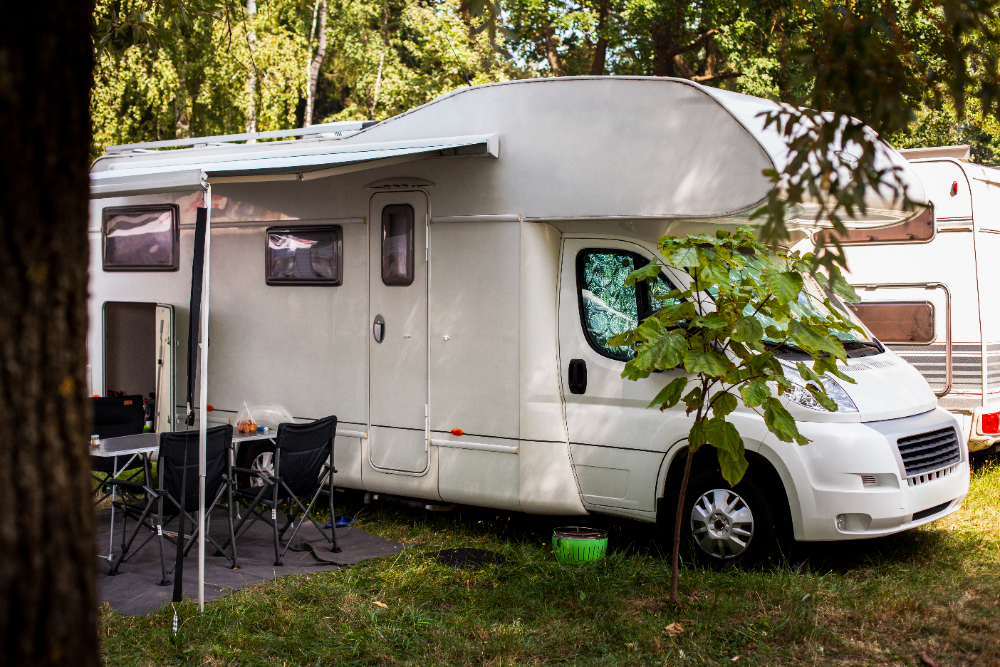For many of our readers, choosing between a carport and a garage can be very stressful. After all, there is hard-earned money involved. For some people, it is a kind of investment where there is no turning back.
That is why getting either a carport or a garage takes a lot of planning, especially for those who own a camper. Owning a camper is a gateway to adventure, offering freedom and flexibility for road trips and outdoor escapades. However, when the road trip is over, ensuring your camper is stored properly becomes a priority.
The decision to park your camper under a carport or store it in a garage involves various considerations, including cost, space, weather protection, and maintenance. Both options have distinct advantages and potential drawbacks, and selecting the best one for your needs can save you time, money, and headaches. This guide delves into the pros and cons of carports and garages to help you make an informed decision.
Importance of Proper Camper Storage
Campers represent a significant financial and emotional investment, often tied to memories of road trips, outdoor adventures, and cherished moments with family and friends. Given their value, proper storage is crucial to maintaining your camper’s condition, ensuring it remains a reliable travel companion for years to come. Exposure to environmental factors like UV rays, rain, snow, and hail can cause gradual but severe damage. UV rays are particularly harmful, fading the paint, cracking seals, and degrading tires. Meanwhile, moisture from rain or snow can lead to rust, mold, and mildew, compromising both the exterior and interior of your camper. Taking measures to shield your camper from these elements is essential for preserving its quality and functionality.
Beyond protecting your camper from weather-related wear and tear, secure storage minimizes the risk of theft or vandalism. Campers often contain valuable items such as electronics, appliances, and outdoor gear, making them attractive targets if left in open driveways or unsecured yards. A dedicated storage space, whether a carport or garage, offers a layer of protection against these risks. It acts as a deterrent to potential thieves and ensures your camper’s interior and exterior remain intact, saving you from unexpected expenses and stress.
Having a well-maintained storage solution keeps your camper ready for use whenever adventure calls. There’s no need to worry about performing last-minute repairs or cleaning off accumulated dirt and debris before hitting the road. Instead, you can enjoy peace of mind knowing your camper is safe, secure, and in optimal condition, allowing you to focus on planning your next journey and making new memories. Whether you’re considering a carport or a garage, investing in proper storage safeguards your camper and preserves its value and utility for the long term.
Carport: An Accessible and Affordable Option
Advantages of Using a Carport
Carports are a popular choice among camper owners for their affordability and simplicity. These structures consist of a roof supported by posts, offering basic protection from sun, rain, and snow. While they don’t provide full enclosure, carports shield your camper from most direct exposure to the elements, helping to prevent long-term weather damage.
One of the key benefits of carports is their versatility. They can be designed to fit campers of various sizes, from small trailers to large motorhomes. Additionally, their open structure allows for excellent ventilation, reducing the risk of moisture buildup that can cause mold or mildew. For homeowners on a budget or those with limited property space, carports are a practical solution that offers convenience without a hefty price tag.
Limitations of Carports
While carports offer essential protection, they lack the comprehensive coverage of garages. Without walls, your camper remains exposed to wind-driven rain, snow, and debris. This can be particularly problematic in regions with extreme weather, where additional coverage might be necessary to prevent damage.
Another concern with carports is security. Their open design makes it easier for unauthorized individuals to access your camper. If theft or vandalism is a concern in your area, you may need to consider additional security measures, such as installing locks or surveillance cameras, to protect your investment.
Garage: Maximum Protection for Your Camper
Advantages of Using a Garage
Garages offer the highest level of protection for your camper, enclosing it entirely to shield it from weather, pests, and potential damage. These structures provide a controlled environment, which is especially valuable in regions with extreme temperatures or severe weather. Unlike carports, garages protect your camper from wind, hail, and snow, keeping it in pristine condition.
Security is another significant advantage of garages. With lockable doors and durable construction, garages deter theft and vandalism. Many garages also come equipped with additional features, such as climate control, which helps regulate temperature and humidity levels. This is particularly beneficial for protecting your camper’s interior, appliances, and mechanical components, ensuring they remain functional and damage-free.
Limitations of Garages
Despite their advantages, garages come with notable drawbacks, primarily in terms of cost. Building a garage requires a significant financial investment, including expenses for construction, permits, and maintenance. Depending on the size and features you need, a garage can cost tens of thousands of dollars, making it a less accessible option for some camper owners.
Additionally, garages require more space and often need a flat, stable area for construction. Homeowners with smaller properties may find it challenging to accommodate a garage, particularly if local zoning regulations impose restrictions on building size or placement.
Comparing Costs: Carport vs. Garage
The cost difference between carports and garages is one of the most significant factors influencing the decision. Carports are generally more affordable, with prices ranging from a few hundred to several thousand dollars, depending on the materials and size. In contrast, garages are a more substantial investment, with costs reaching into the tens of thousands, especially if you include features like insulation, electrical wiring, or climate control.
For those working with a limited budget, a carport can provide essential protection without the financial burden of building a garage. However, the long-term benefits of a garage, including increased security and better weather resistance, may justify the higher cost for those who can afford it.
Space and Installation Considerations
Space Requirements
Carports are more adaptable in terms of placement, as they require less space and don’t need a foundation. This makes them an ideal choice for properties with limited room or uneven terrain. Their lightweight design also means they can be relocated if necessary, providing flexibility for homeowners who may need to adjust their setup over time.
Garages, on the other hand, require more planning and preparation. They need a stable foundation and sufficient space for construction, which can be challenging for properties with limited room. Additionally, building a garage often involves navigating local building codes and permits, which can add time and expense to the process.
Installation Time
Carports are easier and quicker to install than garages. Many carports come as prefabricated kits that can be assembled in a matter of hours or days, depending on the size and complexity of the structure. Garages, by contrast, require a longer construction process, often involving site preparation, professional labor, and detailed planning.
Weather Protection: Which Option is Better?
The level of weather protection you need largely depends on your local climate. In regions with mild weather, a carport may provide sufficient coverage. However, in areas prone to heavy snow, hail, or strong winds, a garage offers superior protection. The enclosed design of a garage prevents snow accumulation and shields your camper from hail damage, while its sturdy construction is better suited to withstand high winds.
Maintenance and Longevity
Both carports and garages require regular maintenance to remain effective. Carports, typically made from metal or aluminum, need occasional cleaning to prevent rust and corrosion. Garages, while more robust, require additional upkeep, such as painting, insulation checks, and pest control. However, their durability and comprehensive coverage often result in a longer lifespan, making them a worthwhile investment for long-term camper storage.
Resale Value and Aesthetic Appeal
Adding a garage to your property can increase its resale value, as potential buyers often view garages as a desirable feature. Garages also offer more design flexibility, allowing you to match the structure to your home’s aesthetic. Carports, while functional, may not have the same impact on property value or curb appeal. However, their simplicity and cost-effectiveness make them a practical choice for homeowners who prioritize functionality over aesthetics.
Making the Right Choice
Choosing between a carport and a garage comes down to your specific needs, budget, and property constraints. Carports are ideal for those seeking an affordable and quick solution, while garages offer maximum protection and long-term value. By evaluating your priorities, climate, and available space, you can determine the best option for keeping your camper safe and ready for your next adventure.
Conclusion
You can use either a carport or a garage for your camper. Carports offer a budget friendly option while garages provide comprehensive protection and better security.
While both options are good, choose the one that fits your budget and needs. The important thing is you are able to preserve your camper.

